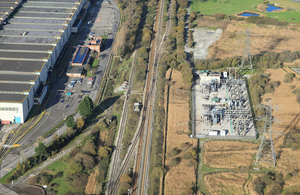Motorists urged to check vehicles before heading off on holiday
Hannah – from Leicestershire – patrols the M1 near East Midlands Airport and says it’s vital people do the basics before setting off to avoid timely breakdowns and delays to other motorists.
The call comes as part of Highways England’s ongoing safety campaign about motorway driving.
It advises motorists what to do if they break down and reminds them to follow speed limits, to keep left except when overtaking and not to ignore Red X signals above closed lanes.
Hannah said:
Today is the day when thoughts turn to those important summer holidays and quality family time. You’ve packed the sun cream, dusted off the sandals and got the suitcase packed. But, have you considered the safety of the vehicle your travelling in?
It’s vital motorists take part in ‘check your vehicle day’ because those plans could be ruined by a simple vehicle breakdown that could have easily been avoided.
She added:
We often find people have run out of fuel and that’s because they have ignored the warning light on the dashboard before setting off. There is an assumption that there is always more in the tank than the indicated level, but that is not the case and other factors such as driving style can quickly reduce fuel levels. Put simply, it’s not worth taking the chance.
By making sure that you have fuel levels topped up, there’s less likelihood of you being forced to make unplanned stops and causing delays to other drivers.
The other common breakdown I come across relates to tyre problems. Again, you shouldn’t always rely on the car to tell you something is wrong. Many modern cars have tyre pressure monitoring systems, but by manually checking the tyre pressure and tread regularly, you can reduce the likelihood of things like tyre blowouts while also improving fuel efficiency. We all have a part to play in helping everyone get where they’re going as quickly and as safely as possible.
The ‘check your vehicle day’ is being supported by 1992 Formula 1 World Champion Nigel Mansell CBE, in his role as IAM RoadSmart president, the RAC, Michelin UK, Green Flag and Halfords Autocentres.
Nigel Mansell added:
The ‘check your vehicle day’ is a great initiative from Highways England. As someone who raced in Formula 1 for well over a decade, I know a thing or two about good vehicle preparation – and what this means for getting to your finish line.
Making sure your car is fully ready for the journey ahead could not only save you and your family a lot of heartache on the way to your destination; but ensure that you, your occupants and other road users are as safe as possible.
It should be a weekly task for the driver to make sure all lights are working on his or her car, all glass areas are clean, wipers clear the windscreen properly, tyres at least meet legal requirements and water and oil levels are topped up.
I am delighted to give my stamp of approval to Highways England’s call to action and please pay attention to it, as it could save your life and those around you.
July and August are the busiest months for breakdowns on motorways and major A-roads with one breakdown reported every two minutes during the final weekend in July and first weekend in August.
Highways England is expecting to respond to an extra 700 breakdowns a week for the next six weeks, taking the average number of motorway breakdowns each week to almost 5,000.
Highways England says simple checks are a way to make sure the vehicle is roadworthy. Things to consider are:
- Check tyres: prior to setting off on a long/significant journey, check your tyre pressures are suitable for the load and the condition of your tyres, including the spare. Look out for cuts or wear and make sure the tyres have a minimum tread depth of 1.6mm, which is the legal limit
- Check engine oil: use your dipstick to check oil regularly and before any long journey, and top up if needed. Take your car back to the garage if you’re topping up more than usual
- Check water: to ensure you have good visibility, always keep your screen wash topped up so you can clear debris or dirt off your windscreen
- Check lights: if your indicators, hazard lights, headlights, fog lights, reverse lights or brake lights are not functioning properly, you are putting yourself and your family at risk. In addition, light malfunctions can be a reason for your vehicle to fail its MoT
- Check fuel: before setting out, check your fuel levels and make sure you have enough to get to your destination
Highways England has also issued five basic safety tips to follow if your car does break down on a motorway:
- Get away from the traffic. Exit the motorway or get to an emergency area or hard shoulder and use the free phone provided.
- If that’s not possible, move left onto the verge.
- Get out of the left side of your car and behind the barrier if you can and it is safe to do so.
- Get help – contact your breakdown provider or Highways England on 0300 123 5000.
- If you break down in moving traffic and cannot leave your car, keep your seatbelt and hazard lights on and call 999.
Get more information about driving on motorways.
General enquiries
Members of the public should contact the Highways England customer contact centre on 0300 123 5000.
Media enquiries
Journalists should contact the Highways England press office on 0844 693 1448 and use the menu to speak to the most appropriate press officer.
